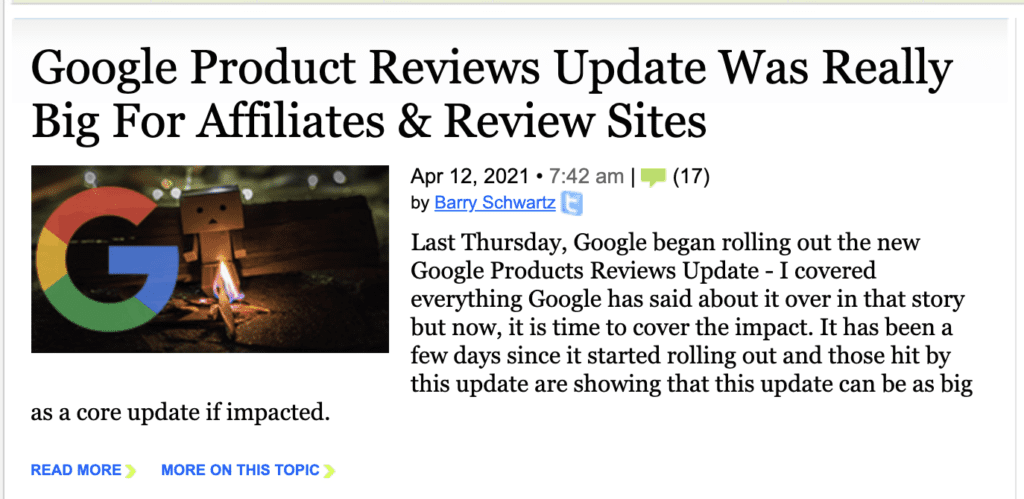If you’re anything like me, you get just a little nervous when you see the words “Google algorithm update” together in one place…
It’s kind of like seeing the words “past due” through the clear plastic screen on a piece of mail. You’re probably thinking, “Oh no, this can’t be good!”
But to be honest, this Google update may be more positive than you think. Let’s dig in and find out!
Google Just Dropped a New Product Reviews Algorithm Update
One week ago today – back on Thursday, April 8, 2021 – Google released a new “product reviews” algorithm update that targeted product reviews in US English globally. The update is outside of Google’s regular core update schedule.

So, now that the dust has settled on this change, should you be giving much thought to it?
I’d say yes!
This simple algorithm change has direct implications for many people in the affiliate marketing world, particularly if you manage a content site or product review site. However, even if your site isn’t primarily centered around affiliate marketing, it could still be affected if you’ve published any review content.
In this quick post, I’m going to break down the Google algorithm changes, how your business might be impacted, and what you should do about it!
What’s in the Google Product Reviews Update?
First of all, let’s talk about what the product review update actually does at a high level:
- It prioritizes product reviews that contain in-depth original research, insightful analysis, and rich content
- It narrowly targets product review content, such as single product reviews, product comparisons, and buying guide/roundup posts
- It doesn’t directly penalize thin content, but rather elevates more helpful reviews
- It applies across “parts of sites, or the site overall,” as opposed to specific URLs
This is the “cliff notes” version for you, but you can learn more about it in the official Google product reviews update on Google’s blog.
One interesting side note: While Google releases plenty of algorithm updates without saying a word to the public, the company seemed to go out of its way to inform people about this one, with a formal blog post and a series of recommendations for how to take advantage of the changes.
That tells me that they really want people to write quality product review content, so you should definitely keep this in mind!
How the Google Update May Affect Affiliate Marketers
Now that we know what’s in the Google product reviews algorithm update, the next question is: What will the update mean for your website or blog?
Well, the obvious consequence could be lower rankings and traffic for any review content that Google deems as derivative, thin, or unoriginal.
In fact, this SERoundTable post about the update has a lot of anecdotal industry chatter from affiliates who have seen steep drops in a lot of their keyword positions. One saw a loss of 20% of their daily traffic, and another saw keywords that were ranking in the top 5 end up dropping out of the top 100 completely!

If your existing review content is essentially summarizing product sales pages or pitch pages and not offering any insights or original research, Google could displace your reviews with higher quality competitor articles. It could also leave you vulnerable to new product reviews that may swoop in and steal some of your best-ranked positions.
But as always, your mileage may vary. Some saw no change, and others saw a noticeable improvement in their rankings! Best of all, this change could also open up new opportunities!
Say you’re doing keyword research on some product review keywords in your niche and you see that the top-ranking content is pretty thin. It used to be an uphill battle to dethrone existing reviews, but now, even a little extra research and quality on your part could be enough to take advantage of this new product reviews update and help you get better rankings on new content going forward.
It’s certainly worth a try!
How to Write Google-Friendly Product Reviews
If you currently promote products using SEO product reviews, then I’m sure you’re already aware of the best practices there.
This new update isn’t a huge surprise – it really just affirms what Google has already said it’s trying to do, which is provide the most valuable resources to users in its search results. With so much review content out there, Google needs a way to determine which product reviews are most helpful for shoppers.

So, one thing Google specifically focuses on in the update is “in-depth research,” rather than thin content that merely summarizes products.
But last I checked, Google’s algorithm isn’t a discerning online consumer – it’s a bot. So how can it know what counts as in-depth or original research?
Well, Google can tell a lot from on-page signals. Here are a few possibilities that could help your existing and future product review content:
- Use unique keywords and phrases that aren’t found on the original sales page (or on competing reviews of the product). This tells Google that your review has something new to say.
- Use impartial words instead of hype-y marketing language. This tells Google it’s an actual review and not strictly there for promoting a product.
- Create original photos and images (or transform existing product photos so they aren’t exactly the same). This tells Google your content is original.
- Write for real shoppers and consumers. More than ever, you should write a helpful review that answers questions and provides valuable recommendations.
I admit, none of these ideas are exactly new, but consider this a friendly reminder: If you’re not doing these things, it’s a good idea to write and update your reviews with them in mind.
And if you are doing them, keep it up, because Google is likely to lift both your existing and future review content.
Next Steps for Affiliates
So, we’ve talked about the update and what it means. What now?
Well, if you have an affiliate site packed full of product reviews, then this update could be a big deal for you (in either direction).
As with all algorithm updates, it may take some time to see how things shake out from this product review update. So, I wouldn’t start making changes willy-nilly.
And also, keep in mind that if you are losing rankings, it’s not because you’re being punished (theoretically) – instead, it’s because Google thinks other reviews around the same topic are more original or helpful.
To compete, you just have to make sure your content adds more value than anyone else’s, which is pretty much the standard advice when it comes content and SEO.
To wrap up, I’ve included Google’s direct advice for product reviewers below.
Specifically, ask yourself if your product reviews…
- Express expert knowledge about products where appropriate?
- Show what the product is like physically, or how it is used, with unique content beyond what’s provided by the manufacturer?
- Provide quantitative measurements about how a product measures up in various categories of performance?
- Explain what sets a product apart from its competitors?
- Cover comparable products to consider, or explain which products might be best for certain uses or circumstances?
- Discuss the benefits and drawbacks of a particular product, based on research into it?
- Describe how a product has evolved from previous models or releases to provide improvements, address issues, or otherwise help users in making a purchase decision?
- Identify key decision-making factors for the product’s category and how the product performs in those areas? For example, a car review might determine that fuel economy, safety, and handling are key decision-making factors and rate performance in those areas.
- Describe key choices in how a product has been designed and their effect on the users beyond what the manufacturer says?
See more information on Google’s official product reviews update blog post.
Product Reviews Algorithm Update: Wrapping Up
Benjamin Franklin was once quoted as saying there are only two things certain in life: death and taxes.
Well, I’d add Google updates to that list.
But the good news is, you now have all the information you need to succeed as an affiliate product reviewer. By writing product reviews with original research, images, and commentary on your affiliate site, you can vault your content to the top of Google.
(Or, you can throw in the towel on this whole approach to affiliate marketing and start promoting ClickBank products without a website!)
Ultimately, I hope this quick guide was helpful for you – best of luck on your affiliate marketing this year!






